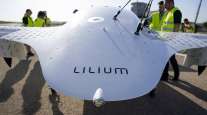Drone Tracking Plan Moves US Delivery by Air Closer to Reality

Deliveries by drones took a step closer to being allowed in the U.S. after a federal advisory panel agreed on a framework for allowing law enforcement to routinely track the small devices.
The committee’s report to the Federal Aviation Administration, released Dec. 19, is a significant step toward widening drone flights to allow them over people, urban areas and over long distances. A system to track and identify drones is necessary before companies such as Alphabet Inc.’s X and Amazon.com Inc. can deliver packages via unmanned drones, or for utilities and railroads can broaden their use for inspections.
While the report laid out the rough specifications necessary for such tracking, various interest groups dissented over whether certain small drones would get waivers to fly without being identified.
RELATED: Amazon delivery drone would dismantle itself in sky, rain down parts
RELATED: Mercedes plans more drone deliveries after 100 perfect flights
Allowing any drones to fly unidentified creates a “potentially dangerous loophole,” a representative for the Air Line Pilots Association said in his comments. ALPA is the largest union representing pilots in North America.
The FAA, which is working with federal and local law enforcement agencies concerned about drone safety and security, will now take the industry and hobbyists comments under advisement and begin drafting a proposed set of regulations requiring tracking.
The report comes on the heels of the first U.S. accident report involving a drone-caused midair collision. Drone incident reports collected by FAA have risen steadily and concerns have grown over the potential for terrorists to use the devices for attacks.
The issue of how drones should be identified pits traditional hobbyists and rapidly growing numbers of people who fly them for recreation against groups that want to dramatically expand their commercial uses.
The Academy of Model Aeronautics, which represents 195,000 hobbyists, said in the report its members have a good safety record that goes back decades and most of their model planes can’t fly long distances and don’t create a hazard. Therefore, they should be allowed to fly at their FAA-approved sites without having to add radio devices that identify them.
RELATED: UPS Foundation to test drones for Hurricane Harvey disaster relief in Texas
RELATED: Flytrex provides drones for grocery delivery in Iceland
However, groups that want to use drones for business, ranging from Alphabet and Amazon to Ford Motor Co., said there should be no wide, recreational exemptions. Allowing large groups of drones to fly unidentified would provide “cover” to the millions of operators who aren’t interested in following the law, said the Commercial Drone Alliance, which has members including Ford and CNN.
There were also disagreements over what tracking technology to use. Some participants preferred a simple radio broadcast that could be monitored only by those nearby. Others wanted a more complex network in which drone tracks would be available anywhere.
The report recommends protecting the privacy of drone operators. Their identities wouldn’t have to be included in any radio identification broadcast, under the recommendations. That information would only be available to law enforcement or FAA officials under the report’s proposals.
That is a deviation from how the FAA and other nations treat traditional aircraft. Their tracks can be followed routinely on flight-tracking websites and the names of aircraft owners are usually publicly available.
SZ DJI Technology Co., the world’s largest civilian drone manufacturer, issued a statement saying that the report helps pave the way for expanded drone uses, even with the disagreements.
“There is still an important discussion to come about how to balance governmental needs and desires with the burdens, costs, and privacy invasions that could be faced by drone pilots depending on the actual technologies chosen and how they are implemented,” said Brendan Schulman, the company’s vice president for policy and legal affairs, one of those who helped prepare the report.




